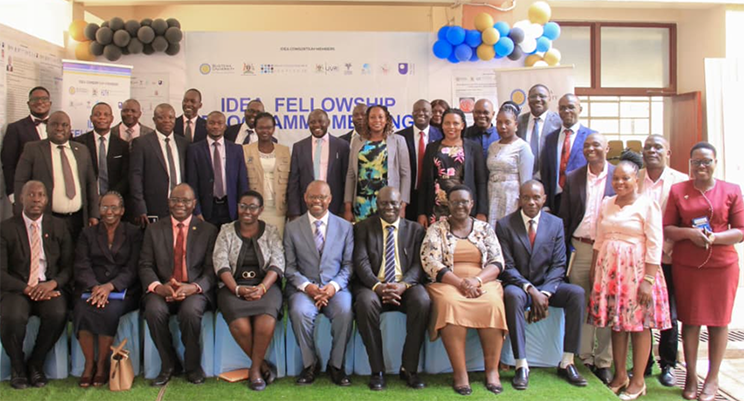From fellowship to frontline: Uganda’s First MSc in infectious disease epidemiology
On 14 August 2025, a major milestone in Uganda’s public health journey was celebrated with the grand exit conference of the inaugural Master of Science in Infectious Disease Field Epidemiology cohort at Busitema University. Under the theme “From fellowship to frontline: showcasing the IDEA programme’s role in strengthening Uganda’s epidemiological workforce,” this historic event brought together policymakers, academics, development partners, district leaders, and alumni to recognise a transformative programme in the field of epidemiology. The IDEA programme is part of the EDCTP and the Africa CDC initiative to support consortia providing Master’s-level training in epidemiology and biostatistics.
The day began with a poster walk-through, during which distinguished delegates and development partners engaged with the fellows’ achievements. Central to their success was a meticulously designed 20-70-10 training model: 20% intensive classroom instruction encompassing advanced epidemiology, biostatistics, GIS mapping, and bioinformatics; 70% immersive fieldwork in some of Uganda’s most challenging outbreak settings; and 10% focused research culminating in a high-quality mini-thesis. This blend of theory, practical experience, and inquiry has produced graduates who are not only analytically adept but also operationally seasoned in infectious disease detection, response, surveillance, investigation, and control.
The opening ceremony featured a distinguished lineup of speakers who emphasised the collaborative vision that brought the programme to fruition. Dr Thomas Nyirenda, Head of the Africa Office, EDCTP Association, highlighted the continental importance of building sustainable epidemiological capacity, while Dr Ario Alex Riolexus, renowned for his leadership in national outbreak responses, shared reflections that resonated with the fellows’ field experiences.
Vice Chancellor Professor Paul Waako praised the resilience and innovation shown by the fellows, reaffirming Busitema University’s commitment to practical, service-linked postgraduate training. The keynote address by the Guest of Honour, Professor Paul Waako, Director General of Health Services, called for the integration of hands-on epidemiology training across universities and highlighted the need for sustainable investment from partners, also praising Uganda’s structured career pathways for epidemiologists within the national health system.
A highlight of the conference was the fellows’ scientific session, during which they presented research that could shape national policy on topics such as antimicrobial resistance, maternal and child health, border health security, climate-related WASH outbreaks, and One Health investigations. Their work not only demonstrated technical mastery but also showcased the essential leadership, adaptability, and integrity required for frontline public health practice.
The conference was not merely a celebration of achievements but also a platform to profile the newly developed PhD in Epidemiology curriculum, launch a national alumni and career tracking system, and unveil the Strategic Roadmap for IDEA Phase II (2026–2029), which outlines plans for regional expansion and deeper integration of One Health.
Professor Peter Olupot-Olupot, an EDCTP Fellow and the coordinator of the IDEA Fellowship, has been recognised for his visionary leadership. He has helped transform the IDEA Fellowship into a nationally recognised training platform that combines academic rigour with practical field experience. This approach ensures a sustainable pipeline of outbreak-ready epidemiologists for Uganda and the broader region.
As the event concluded, fellows were recognised, awards were presented to facilitators and consortium members, and a symbolic cake-cutting marked the occasion. The message was clear: the IDEA Epidemiology Fellows are decisively moving “from fellowship to frontline,” equipped with the skills and resolve necessary to confront today’s public health challenges and anticipate those of tomorrow. The IDEA Fellowship now stands as both a national triumph and a continental model, demonstrating that when rigorous academic training is combined with extensive real-world experience, the outcome is a cadre of epidemiologists capable of strengthening health security from the community level to the global stage.

